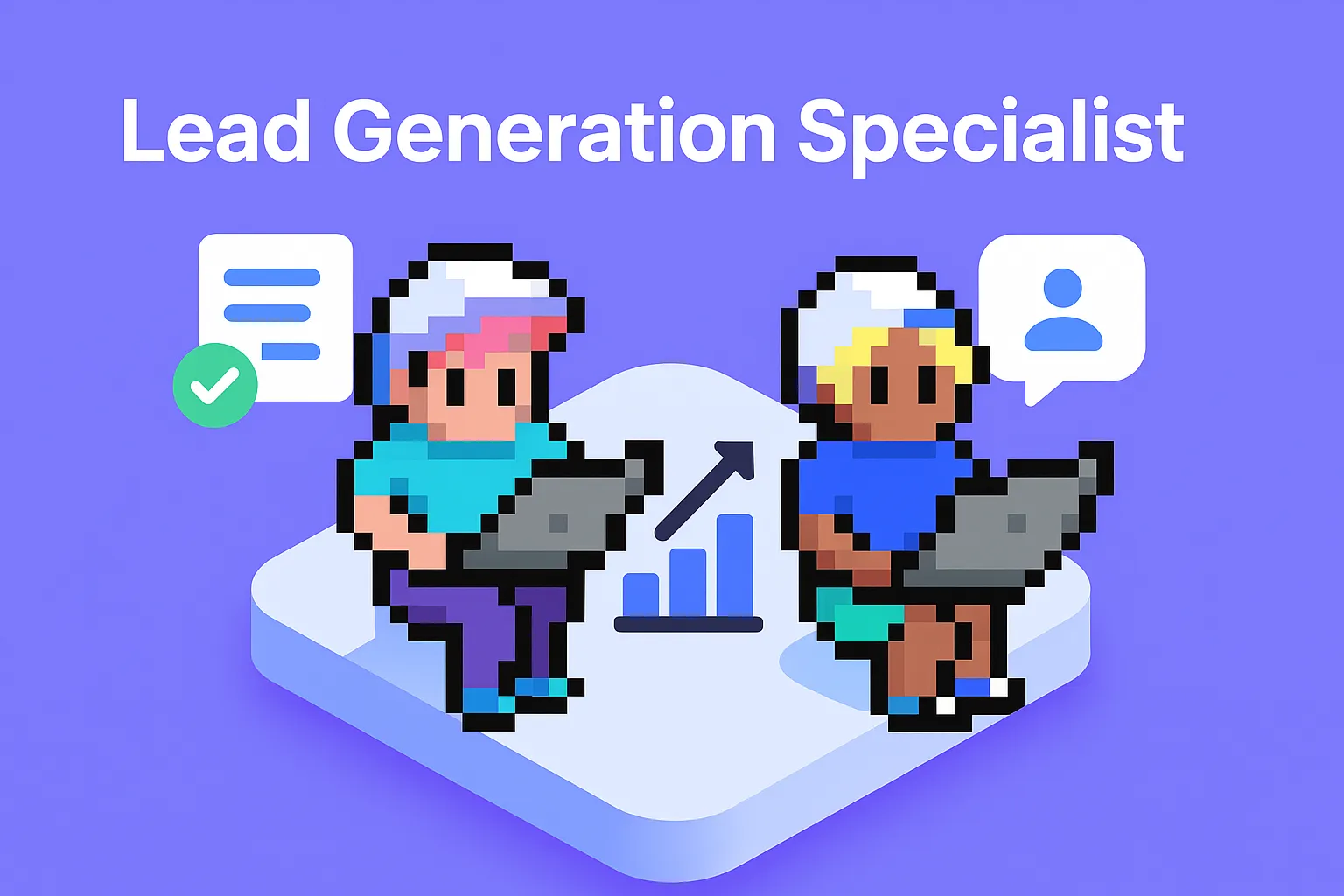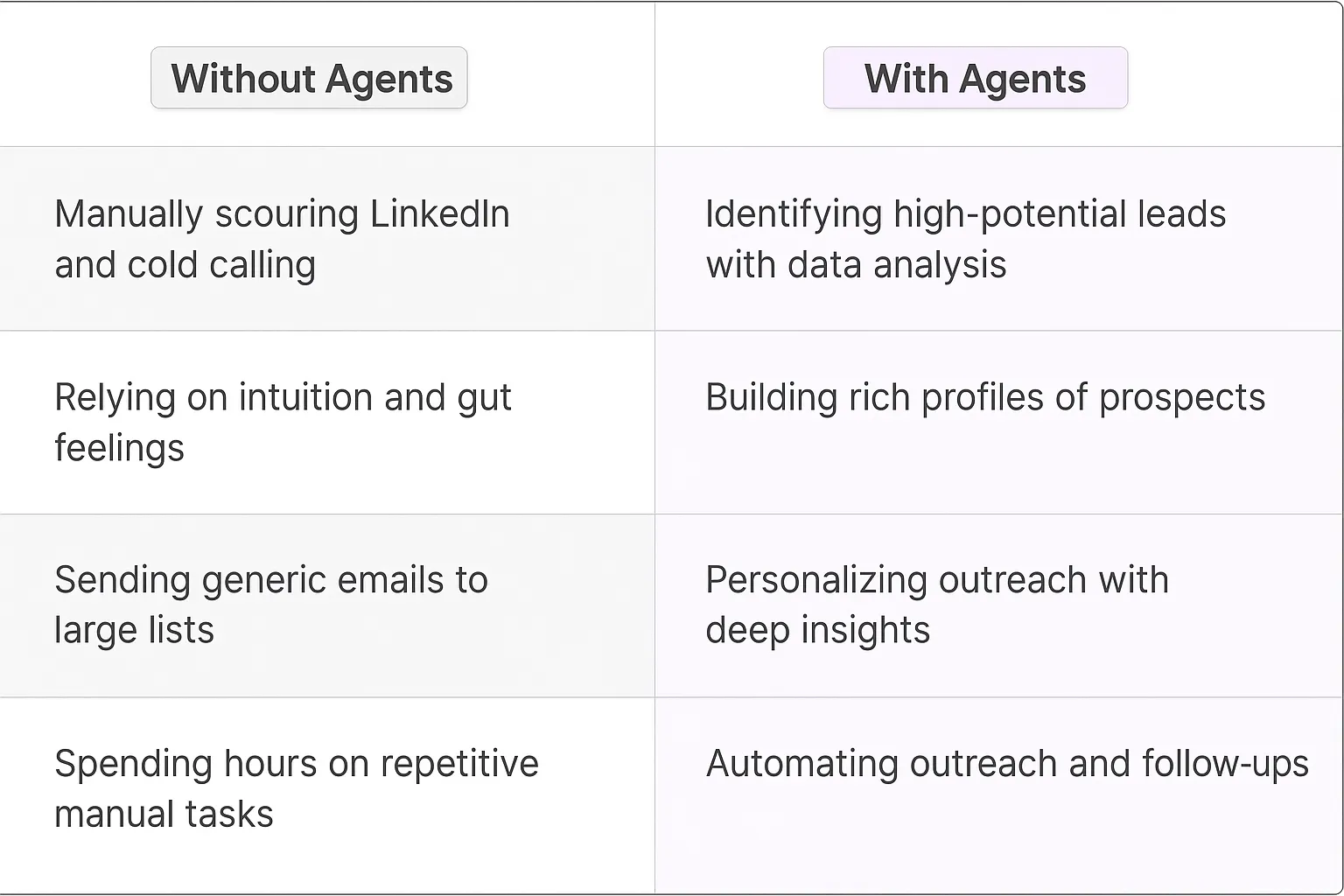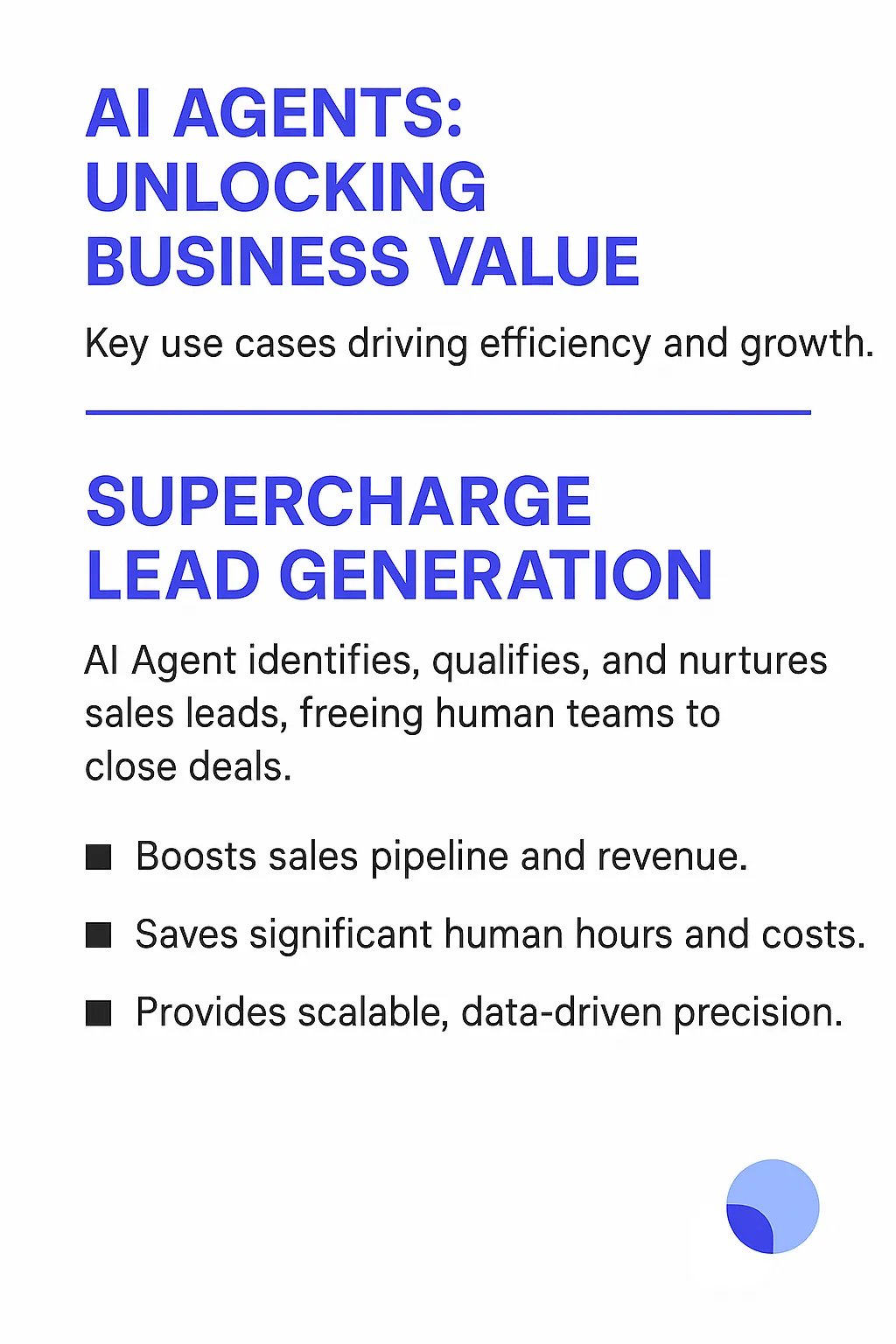A Lead Generation Specialist is a digital teammate that uses artificial intelligence to supercharge the process of finding and qualifying potential customers. It's like having a tireless, data-crunching sales prodigy working 24/7 to fill your pipeline. This AI-powered tool sifts through mountains of data, identifies patterns, and predicts which leads are most likely to convert, all while learning and improving with each interaction.

Before AI agents entered the scene, lead generation specialists were stuck in a world of manual grunt work and endless spreadsheets. They'd spend hours scouring LinkedIn, cold calling, and manually updating CRMs. It was like trying to fill a leaky bucket - inefficient, time-consuming, and often frustrating.
The old-school approach relied heavily on intuition and gut feelings. Sales teams would throw spaghetti at the wall, hoping something would stick. They'd blast out generic emails to massive lists, crossing their fingers for a 1% response rate. It was a numbers game, but one with diminishing returns and burnt-out sales reps.
Enter AI agents - the secret weapon that's quietly reshaping the lead generation landscape. These digital teammates are like having a team of data scientists, market researchers, and sales gurus working 24/7 to fill your pipeline.
First off, AI agents are masters of pattern recognition. They can sift through mountains of data, identifying high-potential leads that human eyes might miss. It's like having a supercharged metal detector for golden opportunities.
But it's not just about finding leads - it's about understanding them. AI agents can analyze a prospect's digital footprint, from their Twitter likes to their company's recent press releases, building a rich, nuanced profile. This deep insight allows for hyper-personalized outreach that feels less like a sales pitch and more like a tailored solution to their specific needs.
The real game-changer is in the automation of repetitive tasks. AI agents can handle the initial outreach, follow-ups, and even basic qualifying questions. This frees up human specialists to focus on what they do best - building relationships and closing deals.
Perhaps most importantly, AI agents learn and improve over time. They're constantly refining their approach based on what works and what doesn't. It's like having a sales team that gets smarter with every interaction, continuously optimizing for better results.
In essence, AI agents are transforming lead generation from a hit-or-miss art into a data-driven science. They're not replacing human specialists, but rather amplifying their capabilities, allowing sales reps to work smarter, not harder. It's a shift that's quietly revolutionizing the sales landscape, and those who embrace it early will have a significant competitive edge.

Lead generation specialists are constantly on the hunt for new ways to identify and engage potential customers. AI agents are becoming their secret weapon in this never-ending quest. These digital teammates can transform how we approach lead gen, making it more efficient and effective than ever before.
One key process where AI shines is in lead scoring and qualification. Traditional methods often rely on gut feelings or simplistic point systems. AI agents, on the other hand, can analyze vast amounts of data to identify patterns that humans might miss. They can consider factors like online behavior, social media activity, and company information to predict which leads are most likely to convert.
Another process ripe for AI disruption is personalized outreach. Gone are the days of generic email blasts. AI agents can craft tailored messages that resonate with each prospect, considering their industry, role, and specific pain points. This level of personalization at scale was previously impossible, but AI makes it a reality.
When it comes to specific tasks, AI agents are proving to be invaluable allies for lead generation specialists. Let's break down some of the most impactful use cases:
The beauty of these AI-powered tasks is that they free up human lead generation specialists to focus on what they do best: building relationships and closing deals. By handling the time-consuming, data-heavy aspects of lead generation, AI agents allow humans to bring their creativity, empathy, and strategic thinking to the forefront.
As we continue to push the boundaries of what's possible with AI in lead generation, we're likely to see even more innovative use cases emerge. The most successful lead generation specialists will be those who embrace these digital teammates and learn to work alongside them effectively. The future of lead generation isn't human vs. machine - it's human and machine, working in harmony to drive unprecedented growth.

Lead generation specialist AI agents are reshaping how businesses attract and nurture potential customers across various sectors. These digital teammates bring a unique blend of efficiency, personalization, and scalability to the table. Let's dive into some industry-specific scenarios where these AI-powered lead gen specialists are making waves and driving real business impact.
From tech startups to established financial institutions, companies are leveraging these AI agents to not just fill their sales pipelines, but to do so with precision and intelligence. They're not merely automating tasks; they're augmenting human capabilities, allowing sales teams to focus on high-value interactions while the AI handles the heavy lifting of initial prospect engagement and qualification.
The following use cases illustrate how lead generation specialist AI agents are becoming indispensable digital teammates across different industries, each with its unique challenges and opportunities in the lead generation landscape.
The real estate industry is ripe for disruption, and Lead Generation Specialist AI agents are poised to be the game-changers. These digital teammates are reshaping how realtors and agencies identify, nurture, and convert potential buyers and sellers.
Consider a boutique real estate firm in a competitive urban market. Traditionally, agents would spend countless hours cold-calling, attending networking events, and manually sifting through outdated databases. Enter the Lead Generation Specialist AI, and suddenly, the rules of engagement shift dramatically.
This AI doesn't just compile lists; it's a hyper-intelligent prospecting machine. It scours social media, analyzes public records, and even interprets satellite imagery to identify properties likely to hit the market soon. By processing vast amounts of data, it can predict which homeowners might be considering a sale based on factors like job changes, growing families, or neighborhood trends.
But here's where it gets really interesting: the AI doesn't stop at identification. It crafts personalized outreach strategies for each potential lead. For a young family eyeing school districts, it might emphasize nearby educational facilities. For an empty-nester, it could highlight the benefits of downsizing. This level of customization at scale was previously unthinkable.
The AI also optimizes timing and channel selection. It knows when a particular lead is most likely to engage – perhaps right after they've searched for "home value estimates" online – and can trigger an immediate, relevant response through the most effective medium, be it email, social media, or even a prompt for a human agent to make a well-timed call.
What's more, this AI learns and improves with each interaction. It's constantly refining its understanding of what makes a qualified lead, adjusting its algorithms based on successful conversions and failed attempts alike. This creates a virtuous cycle of ever-improving lead quality and conversion rates.
The result? A real estate firm that operates with unprecedented efficiency and precision. Agents are freed from the drudgery of cold prospecting and can focus on what they do best: building relationships and closing deals. The AI doesn't replace the human touch – it amplifies it, ensuring that every interaction an agent has is with a lead that's been pre-qualified and primed for engagement.
This isn't just a marginal improvement; it's a fundamental reimagining of the real estate lead generation process. Firms adopting this technology aren't just staying competitive; they're redefining what's possible in their industry. As this AI continues to evolve, we may well see a future where the most successful real estate professionals are those who best know how to collaborate with and leverage these powerful digital teammates.
The e-commerce landscape is a battlefield, and Lead Generation Specialist AI agents are the secret weapons smart companies are deploying. These digital teammates are completely overhauling how online retailers find, engage, and convert potential customers in a space where attention is the scarcest resource.
Let's zoom in on a mid-sized fashion e-tailer competing against industry giants. Traditionally, they'd blast out generic email campaigns, run broad social media ads, and hope for the best. Now, with a Lead Generation Specialist AI in their arsenal, they're playing a whole different game.
This AI isn't just crunching numbers; it's a behavioral prediction powerhouse. It analyzes browsing patterns, purchase history, social media activity, and even weather data to identify not just who might buy, but what they'll buy and when. It's like having a crystal ball that actually works.
The AI's capabilities go far beyond simple demographic targeting. It creates intricate psychographic profiles, understanding the values, attitudes, and lifestyle choices that drive purchasing decisions. For a sustainable fashion brand, it might identify consumers who've recently engaged with environmental content, flagging them as high-potential leads.
But here's where it gets really fascinating: the AI orchestrates multi-channel, perfectly timed outreach campaigns. It might notice a user lingering on a product page, then serve them a targeted ad on Instagram featuring that exact item styled in a way that aligns with their aesthetic preferences. If they don't bite, it might follow up with an email showcasing similar items at a price point it knows they're comfortable with, based on their purchase history.
The AI is also a master of context. It understands that a lead who's been browsing winter coats in July is likely planning a trip to a colder climate. This insight triggers a personalized campaign featuring travel accessories and destination-appropriate clothing, turning a single potential purchase into a much larger opportunity.
What's truly game-changing is the AI's ability to learn and adapt in real-time. Every click, every purchase, every abandoned cart feeds back into its algorithms, continuously refining its understanding of what works. It's not just learning; it's evolving at a pace that would make Darwin's head spin.
The results are staggering. We're seeing conversion rates that would have been considered fantasy just a few years ago. But more importantly, we're seeing a fundamental shift in the relationship between retailers and consumers. The spray-and-pray approach is dead. In its place, we have hyper-relevant, perfectly timed interactions that feel less like marketing and more like a personal shopping assistant who knows you better than you know yourself.
This isn't just a tool; it's a paradigm shift. E-commerce businesses that embrace this technology aren't just improving their metrics; they're redefining what it means to connect with customers in the digital age. As these AI systems continue to advance, we're moving towards a future where every interaction between a brand and a consumer is meaningful, relevant, and mutually beneficial. The companies that master this new reality will be the ones that dominate the next era of e-commerce.
Implementing a Lead Generation Specialist AI Agent isn't just about plugging in some code and watching the leads roll in. It's a complex dance of data, algorithms, and human touch. First off, you're dealing with the beast that is data integration. Your AI needs to pull from multiple sources - CRMs, social media, web analytics - and make sense of it all. It's like trying to conduct an orchestra where every instrument is playing a different song.
Then there's the machine learning model itself. Training it to understand the nuances of lead quality is no small feat. It's not just about quantity; it's about finding those golden nuggets that are most likely to convert. You're essentially teaching a machine to think like your best sales rep, minus the coffee addiction.
Let's not forget about privacy and compliance. With regulations like GDPR and CCPA, your AI needs to be a legal eagle as well. It's got to know what data it can use, how to use it, and when to forget it. One misstep here, and you're not just losing leads - you're losing your shirt in fines.
On the operational side, you're looking at a shift in how your entire sales funnel works. Your human team needs to learn to work alongside this digital teammate. It's not about replacement; it's about augmentation. But try telling that to Bob who's been your top sales guy for 15 years. There's a real change management challenge here.
Then there's the question of lead handoff. Your AI might be great at finding leads, but how does it pass them to the human team? You need a seamless process that doesn't feel like you're playing a game of telephone with a robot. And let's talk about feedback loops. Your AI needs constant input to improve. But who's responsible for that? Your sales team is busy, you know, selling.
Lastly, there's the ROI question. AI isn't cheap, and stakeholders will want to see results. But lead generation isn't always a straight line to revenue. You need to set realistic expectations and have the metrics in place to show value beyond just the number of leads generated. It's about quality, conversion rates, and ultimately, revenue impact.
Implementing a Lead Generation Specialist AI Agent is like trying to solve a Rubik's Cube blindfolded. It's complex, it takes time, and you'll probably mess up a few times before you get it right. But when you do, it's a game-changer. Just be prepared for the journey - it's more marathon than sprint.
Lead Generation Specialist AI Agents are not just another tool in the sales tech stack - they're a paradigm shift. They're redefining what's possible in lead generation, turning it from a numbers game into a precision operation. As these AI agents continue to evolve, the businesses that learn to harness their power effectively will have a massive competitive edge. The future of lead generation is here, and it's smarter, faster, and more personalized than ever before. The question isn't whether you'll adopt this technology, but how quickly you can integrate it into your sales strategy. Because in this new landscape, those who hesitate may find themselves left in the dust.